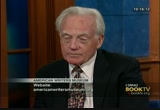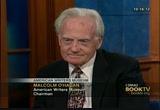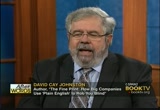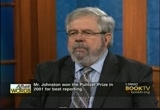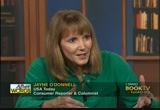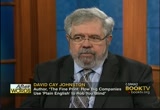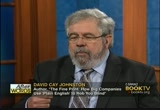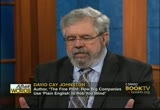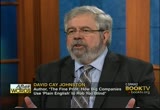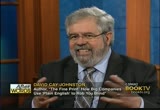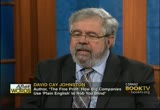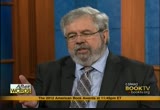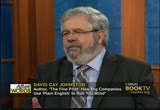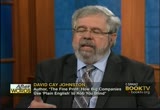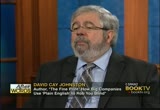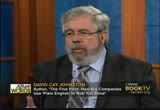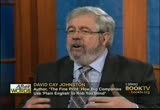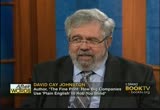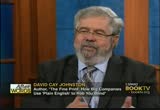tv Book TV After Words CSPAN November 10, 2012 10:00pm-11:00pm EST
10:00 pm
think foreign leaders should read. >> american writers museum.org is the website. you also tweet outen a regular basis. we'll put up the twitter handle as well. malcom, can people donate to the american writers museum at this point? >> when we talked two years ago, peter, they could not. we department have a donate button. that's one of the other development that occurred. yes, we have a donate butt town. -- button. we would be encouraged to make have your viewers make donation. why it's important as we go out to the major funders it will be helpful to ask to be able to show -- a lot of people have already donated and shown their interest and how importants to the donations. i would encourage all of your viewers to do that. no matter how modest $100, $50,
10:01 pm
10:02 pm
>> host: malcolm o'hagen, the find chairman of the american writers museum. this is book tv on c-span2. >> david k. johnston, the best are selling author, reveals the surprisingly numerous ways in which corporations systematically exploit their customers. >> host: seems the basic intention of your book is we're all getting taken by corporations and the government is letting them get away with it. i. >> guest: yes. >> host: people often say that reporters like you and i, these are the worst cases. it's not as bads a you describe. i belt there's more example.
10:03 pm
did you have trouble filling this book? >> guest: no, i could do another book and maybe two more books on the same theme about what is going on. and unfortunately we need to keep in mine what adam smith taught when he wrote "the wealth of nations" in 1776. seldom to businessmen gather than the subject comes to raising prices prices and lower. and big corporations have tried to work the rigors of market competition artificially raise prices, provide very poor service compared to some other industries or countries -- in a few cases literally put lives is a risk, and how we don't have a balance system focused on competitive markets. >> host: we'll go through some of these specific examples, everybody that talks to you has their favorites.
10:04 pm
but to you, what was the most egregious. >> guest: a man named bob manning, a 26-year-old lineman for the electric power company in upstate new york. niagra mohawk. and one day in february of 1962, as he was coming down off a power pole, a bolt of electricity went loose and he fell to the payment, paralyzed from the neck down. i met bob when he called "the new york times" for help because he cooperate collect his workers compensation benefits 35 years later. that's not the egregious story i tell in the book. that story is the power company was sold. the insurance company that had his claim, which was owned by a bunch of utilities, was then sold. and they had a finding that there were no cases of refusal
10:05 pm
to pay benefits. the new york state insurance department. i called them and said did you not read the front page of "the new york times," what the governor said? we don't pay any attention to what's in the newspapers. i said what about all the complaints? they said, he never got a final judicial ruling they refused to pay him. so they gave him a walk after refusing to pay. they did ultimately pay some of the money he was owed. then the insurance policy was bought by a warren buffett company, and a nurse comes around engray shading herself into bob manning's life in california where he moved, and eventually he goes to his home, which they have a investigate to do to inspect. and the mannings are these wonderful people who accommodated three children from a relative where the parents were killed, and marvelous human beings. one of the sons grew up to become an airline pilot. and the nurse goes into bob's room and points to the wall and says, why don't you have a dnr.
10:06 pm
that means do not resuscitate. why how having the medics try to keep you alive when you have an a medical emergency. in effect, asking him to die. and bob's wife, bob, his nurse, his doctor, all the people who saw the nurse do this and her other actions, were just appalled by this. well, you know, warren buffett didn't know about dismiss wouldn't approve of it. on the other hand, what does he say about his company? so long as my managers make their numbers, i let them run the businesses as they see fit. and it's indicative of the callousness going on where we don't have intestinal so focused on profits you can have a company go and say, please die. >> host: when we talk about it in your book, you talk about some of these industries have been deregulated, and often in this presidential campaign, people thing about regulation in
10:07 pm
terms of a republican versus democratic issue. but were more of the problems created because of democrats or republican -- >> guest: this is not a partisan -- there's one party in washington, the party of money. and frankly, if you or i were elected to congress, we'd have to behave like every member of congress does if we want to get reelected, which means we have to his top the people who provide the money for the campaigns for us to run to office, and it's not just joe six pack and mary smith. it's representatives of big corporations and wealthy individuals who come pleading, i just need a little change here to be fair. but they really want to unlevel the playing field and thwart the rigors of the market. there's no such thing as deregulation. that's only new regulation, so what we have done is taken regulations -- i'm not going to defend every regulation, but we took a regulatory scheme that
10:08 pm
looked at the interests of companies and the interests of customers and other parties, and replaced it with a system of the corporations, by the corporations, that takes away consumer rights. everything is regulated. i like to say, baseball regulates right down to how many stitches on the ball and the color of yarn. everything is regulated. most of the regulations in the federal code of regulationses were sought by corporations, business seek regulation, both to define the playing field, but more importantly to try to prevent competitors and escape the rigors of competitive market,. >> host: writing the regulations. >> guest: they're often written by the companies. >> host: interesting to see that. people don't believe it but it happens all the time. >> guest: everybody who works in the sausage faculty knows that happens.
10:09 pm
>> host: so, you refer -- a couple of powerful phrase, you refer to ours being a rigged economy. if you could explain more clearly. >> guest: well, in a competitive market, government would set the rules and as the germans do, with what they call -- adjust the rules as businesses figure out how to game the rules to have as level a playing field. because the market will figure out best how to outfit capital and who should succeed. but it's also a natural tendency in a capitalist market to good toward monopoly where a couple of successful firms get bigger and bigger and remove competition. and when that happened you get constitute typhic indication. you don't want to take risks. you just want to mind the market, do what economists call
10:10 pm
rent-seeking, which means earning profits greater than a market economy. when you add to that these rules and regulations -- in the book, every chapter, -- i'm sure you a reading thises you have not read in the news media. i show how again and again and again the market is being rigged. this is terrible for the national economy and explains why we're in these economic dull doldrums and don't have the job creation. >> we'll get back to some of the ones might have stood out for mow, other than the awful story about bob. how about the internet. >> we're 29 in speed. how disthat come to be.
10:11 pm
>> guest: we paid through the internet, through the efense advance research process agency. so we began at number one, and back in the '90s, al gore, as a senator and vice president and others, promoted this idea we would have this wonderous thing called the internet, and when browsers came along in 1995. it meant that geeks weren't the only people who use and it we have what is know as the internet. the telephone companies and cable companies went to state legislatures and said we're going to make this fabulous thing and there was a great television ad where an old geeser -- geezer, pulls into a hotel, says to the young woman behind the desk, room, king size above, room service, coffee and doughnuts in the lobby. entertainment? she looks at him and says, every movie, every made in every language, in every room. and this was shot at a cafe in the mojave desert. well, the rest of the world is
10:12 pm
doing that. the internet is being made universal in other places. america is now 29th in the speed of the internet behind such leading industrialites as ukraine. we pay 38 times what the japanese pay for a bit of information. if you buy a triple play package -- i have one in my home -- you pay on average with taxes in the u.s., $160. in france, you pay $38 u.s., and you get worldwide calling to 70 countries, not just the u.s. and canada you get worldwide television, not just domestic, and your internet is 20 times faster uploading and ten times faster downloading, and you're paying less than 25 cents on the dollar. all these other countries understand, fundamental principle in the 19th century, canals and railroads were the key to economic growth as
10:13 pm
industrialization came along and you had to move heavy things like steel. as the 20th century came along it was highways, interstate highway program, for example, and airports that were crucial to economic growth. now it's the information super highway. and what does the industry say? don't call it that. the rest of the world -- >> did they literally say that. >> guest: i was told by the pr person at verizon that was not used anymore. that's the only company that actually has fiberoptic to your home. at&t has fiberoptic down the street but not to your home. but the companies are not wiring the whole country they way these other countries are. universal access of really high-speed internet would lead to products and services i can't imagine. but if you build it, they will come. that's how other countries are doing this. we're going to be left in the dust economically. the companies went the state
10:14 pm
legislatures and got changes in the law that said you don't have to provide service to everybody. very few americans know since 1913 they've had a legal right to a telephone. five states repealed that law. i think it's florida, alabama, texas, and wisconsin, i can't find a single newspaper clip telling you this. i called advocacy groups who deal with things like lifeline access for disabled and poor people. they said, what? we didn't hear that happen. >> host: not getting cell service, either. >> guest: that's right. one of the arguments is we don't have a monopoly anymore, we have cable companies, telephone companies, cell phone companies. first of all cell phone is not the equivalent of these other services but under the rules they passed in many places, you can have a cable company and a phone company with cable of some kind, coe action or fiber optics,le running down the street, and refuse to serve you. you live in an apartment
10:15 pm
building with 100 people and only 0 ho want service, they won't wire you. there's a building in new jersey that has not been wired for four years. that building has among its residents the chief rate pair advocate for the state of new jersey. i thought surely some executive at verizon that not politically smart to do and they'll figure out how to wire the building. they want to see the wiring plan for the building and they said, we don't negotiate, we'll punch holes. they didn't do anything. that's how much power these companies have and if the chief rate pair advocate in new jersey can't get fiberoptic service, what do you or i or issue have t this. >> host: i want to get to this at the end with -- but that particular example, what would you tell a consumer in that situation? i know you recommend that people
10:16 pm
get more involved politically and write letters to the editor. >> guest: this book has a lot of solution other than the book about taxes and free lunches and subsidies. i was at the "new york times" and they side to write solutions is to express a bias. so this book has proposed solutions. all three of these books end with the same sentence. reform begins with you. my job is to dig this stuff off out of the record, explain it to you so you can understand it. now it's your job to do something with it or live with the consequences. >> host: if you're living in the building in new york, what would you do personally? >> guest: first of all i'd be complaining to the company. i would go to the state legislature and say, i'm sorry, we have this nice beautiful building, your position is they can just punch holes with no regard for our property. no regard for our property rights or we don't get service? i would make noise with the legislature and get their attention. most of the lawmakers who pass these things, federal and state,
10:17 pm
they have no idea what they're doing. they don't read the bills, never have, never well. >> host: don't know the ramifications. >> guest: the staff says this is the bill for the leadership sends around a note and only a handful of people learn what these things are about, and if there is no pushback, consumer groups or organizations that are supposed to look out for the consumer, as well as private groups, then you get this one-sided development of the law that undoes each principle. syracuse, i teach now one day a week in the law school and the graduate school of business and i teach the history of these things, property and tax in one class and business regulation in the other. we start with this code. everything in the law today pretty much is in the code from social insurance to business regulation to rules on loans to defenses for white collar crimes and how to test them. these laws were developed out of thousands of years of experience. what we're seeing now is these
10:18 pm
big corporations, very quietly, with nobody noticing, undoing thousands of years of human experience to their benefit and to the detriment of the overall economy. >> host: is there a solution? with the state legislature? should they be -- year-round should they be paid more? should the lobbying restrictions be greater? >> guest: this is a real difficult problem. it strikes me that one of the solutions we should be having an active discussion about is public financing of elections. the two states that have tried this, maine and arizona, the incumbents get thrown out, which is surprising. the constitution gives you a right to lobby. the first amendment says, a right to petition for a redress or grievances. interestingly, does not require any response by the government. only required it accept the petition. i don't think the lobbying we're seeing in the state capitols and washington is what the founders
10:19 pm
had in mind. it's accompanied with campaign contributions or the threat of contributions to other people if you don't play ball, and they're the only people who are really being heard. so, i think fundamental reform of the campaign contributions system would be important. and my last book, free lunch, i suggested we put in place a set of rules that opposite your elected to an office like that's, you can't get involved in industries you wore on a committee, maybe pay you a lifetime pension so you're rue moved from the economy. it would be a lot cheaper than the things we're saying now that are extracting bills and hundreds of billions of dollars from peoples pockets that the market would never allow and give them to the corporations. >> host: back to the telecom industry. the remote control. the process on the remote control is fascinating to me. could you go over that? what was the -- a thousand --
10:20 pm
>> guest: glasgow, kentucky, got their names from scott land and they're known for being tight with a buck. they had a cable charger, it was five dollars a month. they built a municipal system, cut prices dramatically, still make money on the system, and they cut the price of a remote to less than a dollar. even at a dollar they make tremendous money. you can buy a remote -- you look carefully at the cable bill, lot of of these bills is line after line of details to get you to not note what's going on. your probably paying 75-cents a month. they buy these things for a couple dollars and they don't ask you to bring it back. >> host: not worth the trip. >> guest: so, $5 a month is indicative, that's price gouging. that's charging a rate of return that is thousands of percent
10:21 pm
over time, and you can do that if you're a monopoly, and to be a monopoly insuring most cases, especially in telecommunications, it's because the government lets you. >> host: the company in glasgow is still there? >> guest: what happened is there was an effort by the company -- the private company to sue them out of business. and newt gingrich when he was speaker of the house and the 1996 telecommunications act wag being debated, set up a group, progress and freedom foundation, think was the name, and it was to raise money from the telecom industry to promote what the telecom industry wanted. they then put the system in glasgow in the red. it was losing money but only because of the cost of litigation, and when it came before a real conservative judge, he listened the industry lawyer and rebound down from the bench and say, sounds like you don't want any competition. well, since then, glasgow has
10:22 pm
modernized the system twice, charges much lower rates than the surrounding monopoly providers ask the same thing happened in lafayette, louisiana, and scottboro, alabama, and chattanooga, with the fastest internet in america, just after over 100 years ago wall street we're not going to wire. you're in the sticks. so the towns then created they're own municipal systems and overall people who get full electricity pay a third less, fewer outages, better service, and even the big systems like the los angeles department of water and power, sacramento, these really big systems, they pay salaries to their top executives that are in six figures as opposed to some of the private corporate utilities now paying 30, $40 million a year for the same service. and people pay higher prices. so the market sometimes is less efficient than local government
10:23 pm
focused on the betterment of a community. >> host: were there other examples? might have been other examples of these kinds of companies, upstart companies becoming done abouting far more competitive. >> guest: an outfit in sacramento tried to start building a system, and immediately at&t cut prices way down to nothing, and the supreme court is very hostile with this notion of predatory pricing, you just cut prices in one location and take the losses until you run the competitor out of business, and that's why we see very little real competition in this area. now, if i can shift gears on you a little bit. i live in rochester, new york. in a suburb. my neighbors and i voted to raise our property taxes, and because of that i have more money in my pocket and it's a good example of market economics are not as simple as you think from what you hear on most
10:24 pm
television shows. in the u.s., we have an ogolopy of garbage companies, and i show how they tell the government, we're in a tightly competitive market, and recorded conversations that i quote, oh, hey, we got this fixed. now how to raskalize the market, get rid of competition, raise prices and we're pushing our competitors who don't wouldn't raise prices to raise prices. how did we raise taxes in my neighbor and cut prices? we had eight different garbage companies and every week a different truck would come down the street. we created a refuse district. then we went to competitive bid. we got the lowest price. one day a week, one truck, every single house on the street, and my bill for garbage collection went from around $600 a year in today's dollars, down to less than half of that. so although i pay higher taxes, i have more money in any pocket.
10:25 pm
paying higher taxes can actually make you richer. depends how the money is spend. can make you poorer but can also make you wealthier. >> host: a perfect example how consumers can make a difference in their own life. >> guest: absolutely. we took action to create the district. i tell my story of the neighbors who did the hard work to make this happen. >> host: one of the sections in the utility section, eliminating the corporate income tax on utilities will end the blatant legalized -- the. >> guest: pseg is the utility in new jersey. >> host: can you explain that? how eliminating the corporate -- >> sure well, psed -- half the states voted to get rid of the traditional integrated utility. it general rated electricity in the power plant, transmilted and it then distributed it to homes and offices and ran the whole thing top to bottom in half of
10:26 pm
the states where we got rid of that and said we're going to have you buy on the open market, prices have gone like this, they're up 48% real terms after you adjust for inflation since 1999. this is a case of market rules are actually designed to raise prices, not to lower prices. pseng was told you have to get rid of your power plant. so did they have an open auction and sell them? no. they transferred them from their regulated utility pocket to an unregulated pocket. so the same power plant, burning the same fuel in the same locations, selling electricity the same people and the same businesses but now the company buys it from itself. when they did this, the companies had already written off most of the value of these plants, and there's something called accumulated income tax deferral account that as these plants have one written down, the money gets paid back to the government. so you write it off today and pay the taxes in the future.
10:27 pm
wouldn't you like to have the interest on say a billion dollars in the next ten years? the state of new jersey did this and i believe most of the other states, including pennsylvania, they forgot about the account. they said, oh, these plants are being sold at an increased price. even though they're only being transferred the same company. they owe income taxes on the gain because the wrote them off. so they made customers pay what's called stranded costs that included income taxes, they borrowed money, have to pay -- >> the customers are paying. the customers are paying twice for the income tax and the company got to pocket the money, and pseg has never denied this. they've always said, this is settled matter. we're not going to discuss this anymore. it's over. they've been very careful to never deny they pocketed all this money. now, the second part of this is that a utility companies often held what is called a holding company structure you have your local utility you write a bill to for your electric, water, natural gas, but it's actually owned by another company and increase leg they're own bid
10:28 pm
companies in spain and france because european rules are fairable to making profits. the companies up here operate with borrowed money. so the utility makes a profit of 11% after taxes. the company up here actually makes maybe 30%. and those taxes fully charged to you at the highest possible rate, in many cases never get to the government. not that they're delayed. not the ten-year loan on the interest of a billion dollars but the holding company gets the money and the federal government, state government, never sees the money. when i exposed this back in 2002, i think it was, in "the new york times," oregon passed a law that said you collect the taxes, give it to the government or give it back to the customers portland portland general long, no problem. the local gas utility, no problem. a company called pacific corp. on the other hand by warren buffett, said that's not fair and got it overturned.
10:29 pm
what goes on now warren buffett's utility collects the rates, collect the income tax, and there's no evidence that income tax ever gets to the government and therefore the company earns more than it's supposed to earn and this undoes a principle in the law called justice and reasonable for monopoly. the openers of monopolies should earn a just and randal prompt if not they won't maintain the system. the customers should pay a just and randal price. if you say the just and reasonable price i x and then you throw in this income tax and the company pockets it? now it's an unjust and unreasonable price. the consumers are losing, the company is gaining. violates the standard for regulation. it's an enormous amount of money. the average electric bill is 5% of your bill is these taxes. if you can collect one penny a day from everyone in america, at the end of the year you'll have a billion one hundred million
10:30 pm
dollars, or collect a dollar a day. now you have $111 billion and it doesn't take along before you and i aren't do well and there's a handful doing extraordinarily well. >> host: one of the statistics that jumped out at me is from 1983 to 2010 the number of americans rose 36% but the number of utility workers fell 15%. now, that of course comes to mind -- i don't know if this area in washington, dc i any worse but everytime there's a storm we lose pour -- power for a long time. a friend who is a foreign correspondent says he feels like he is in there'd world company. >> guest: the washington, d.c. corporate utility which gets 18% of its money from the taxpayers, including the taxes that is supposed to go back to the government -- is the champion of tax wait in any other corporation. they're bert at it than general electric. they're really got at it.
10:31 pm
they set up holding company mechanisms so they make money have the tax system. they're also one of the worst utilities in america when it comes to service, and i wrote about this some years ago. the washington post did big investigation because it got to be so bad. by the way, municipal systems generally have extraordinarily good service records because they're run as a public service for the community, rather than to make a profit. and so pepco is not unusual. the utilities were being hollowed out. career utility people, who understood the had to run the businesses well in terms of service, have been replaced by financial folks. and they've been hollowing out these utilities. so in california, pacific gas and electric got rate increases so it could replace power poles on a 50 year cycle. that's reasonable.
10:32 pm
a few last 100, on average, 50 years. they got the rate increase pay for this, they play reeseed poles on a 775 year cycle. not 46,000 poles a year but 3,000 pole as year, and so their power polls today if nothing changes will have to last until 2775. now, if you're a competitive business and you do that you don't renvois in the business, don't replace equipment, you go broke, bit if you're your a monopoly utility, when the disaster comes and power poles collapsor, run to the government and say we need an emergency rate increase and i you've managed to get the legislature under deregulation to get rid of the utility staff that is supposed to stand up for the public, and you manage to get rules in place like the federal energy regulatory commission has done, to basically say you can't challenge anything we do, there's a fight going on right now where they dismiss without any discussion challenges to their practices and pipelines
10:33 pm
out there they regulate earning over 50% annual profit and they've given them a 38% rate increase over five years. what you do is you get this rate increase and then if there's nobody watching, it becomes a permanent rate increase, so the executives today get to report higher profits than they were really earning and therefore more money from their stock options and in the future, those executives will do just fine because they'll get more money, and who loses? the customers. >> host: do the public outcries that happen after these mass blackouts make a difference? or is it they pay a lot of attention and give lip service -- >> guest: i don't think so. i think this is a real fundamental problem. the utility board are really insulated. when i first wrote about the public utilities in the early 18970s, the utility boards i dealt with a at least had some people who weren't directly connected to the industries.
10:34 pm
the california had a brilliant businessman who just died recently and probably made himself a billionaire before he died, who were critic office -- critics of the industry and tried to get utilities to behave to help the economy. the commission are in governor schwarzenegger was run by people from the utility industry. the former head of called e edison, a cell company owner and a finance year of the energy company, and a quote the editor of the only paper in california that's been tough on the utility industry, the man teka who says pud -- calls it the profit upkeep commission. >> host: there's so many other examples that are interesting to me. but get into a couple of those i
10:35 pm
didn't mention. there's a section on 401ks and retirement savings. what do you find -- what would you like to talk about and is there a lesson in there? what we can do as individuals? >> guest: i call them 201(k). if everybody knew how to invest money well then the average job on wall street would pay average wages. it's absurd. for all of my education and knowledge and -- i went to the chicago school, i'm not really a good investor. i just know, spend less than you make. the efficient way to take care of people's old age, which there's no escaping, is through defined benefit pension plans, and you're hearing the industry say get rid of these. that's nonsense, you can call up an insurance company, i'm this age, i want money at this age, here's how much i have, and tell them your gender and give them a
10:36 pm
blood test and they'll say we'll with you this much. what went wrong? companies after the employee retirement income security act was passed in 1974, went to congress and they kept getting this little change and this little change and this little change to not put in the appropriate amount of money. we know how much to put in. this is not a secret. we have had pensions going back four and five hundred years but who pays attention to these little rules. can you imagine goings to the u.s.a. aye today saying there's this little rule, paragraph c, and they're trying to rewrite the order of the conjunctions in it. >> host: that's not going to play well. >> guest: so they get the rules rewritten to underfund these things and raid them. i have a pension that has been thoroughly raided and will probably die before i do. so, 201(k), 401k, are an action of history. an effort by one industry, financial services, to allow
10:37 pm
executives to save extra money. and it blew up into this big huge system. we need to have a rational policy that recognizes that people need to have money put away for their old age and not run out of money. the average worker in america retiring doesn't have near enough money to go on so you're going to see more and more people in their 70s and 80s working. maybe that's good for those who can work. i don't plan to ever retire. what about my brother who spent his life as a ditch digger. he was down in the culvert getting the tree out of there so the road didn't flood. h is disabled now. he can't work. we have to think about the system and not our individual situation. >> host: was there any other -- there is an issue i didn't touch on? >> guest: so many we could do hours and hours. >> host: i want to talk -- >> guest: four years digging
10:38 pm
thing this stuff out. >> wells fargo, goldman. >> guest: let me do goldman and wells fargo. when detroit was bailed out by washington, everybody took a haircut. the ceo and the january it in -- janitor took a haircut. the ceo lost a third of their guaranteed pension. when wall street was bailed out by the previous administration, nothing changed. a lot of people have heard the story how goldman sachs had $13 billion, third of its capital, with aeg and made a bad bet that would have paid off on pennies on the dollars. instead in a meeting of government leaders, including the treasury secretary who just happened to be the former chairman of goldman, and the one nongovernment person in the room, the current chairman of goldman, made a decision that led to 100-cent the end dollar being paid to goldman. the government thoroughly bailed
10:39 pm
goldman out. there's another deal goldman made was a $5 billion gift to goldman. they just bail new headquarters with your taxpayer dollars. taxpayers are paying your bills, it's ease you to make a profit. so, that's one of the things that has been minimally explored in the news media. in the wells fargo example is, deals with a woman in washington, dc, a school bus driver. she needed to buy a new car. she got talked into pay three time the value of a used car by a car salesmen. wells fargo financed the deal. she would have paid $30,000 for a $6,000 car with interest. she got pregnant and went on disable. she tried to give the car back and thigh want. wells fargo said we're going to take your house. and under the agreement you -- buy an appliance you give up your right to sue and are put
10:40 pm
into arbitration. they have all the cards. if you go to arbitration you might do that once in your live. but the ash iters know it's the bank and the car dealer and the other companies they come to you every day, and this is called repeat player problem. they have an economic interest in making happy the people you're up against because they're going to hire them again and a again. two law students at american university, took the case, creatively ran with it. ultimately the woman didn't have to pay and wells fargo paid damage. what did wells fargo say to the single mother? we'll take your house, and all of this is because of the 1925 federal arbitration act, which probably nobody in this audience ever heard of. it was passed so companies who had disputes across statelines and wanted to go to arbitration, had the option of doing so. the supreme court, particularly the people i call the radical ahistorical members of the supreme court, scalia, thomas, roberts, have twisted and extended and expanded this thing to be an anticonsumer law
10:41 pm
because they're corporatists and do numerous things that have no basis in history or the constitution while claiming there's their guide. and i believe that if the federal arbitration act as currently interpret bid the supreme court came up for a vote today and banned all soreses of things that would make the system nor efficient, it would not get a single vote from a single member of congress. no one would vote for this if it came up today and it's being used by corporations as a tool against consumers and small business owners and franchise agreements and other areas, to increase their power over their customers. >> host: you mentioned dodd-frank and it's come up recently in the campaign about whether it should be repealed in part or in whole. what's your -- >> guest: i'm not a plan of dodd-frank. the best regulation is the least
10:42 pm
regulation you. want to have regulation that encourage virtuous behavior. we had an ex-law called glass stiegel. we had almost no bank failures in this country. after world war ii. and it was a simple principle. you want to be in the gaming business, you want to underwrite security and bond or as we do today, sell derivatives and 90% of goldman sachs' business is not capitol to build factories and offices, it's derivatives and trading. i you've haunt to gaming go ahead but you can't be in the retail banking business and you can't be in the insurance business if you do that. and banking and nashance are basically the same business. the difference is you make a deposit at a bank and with draw on demand. at an insurance company, you don't get a withdrawal if your
10:43 pm
fire doesn't burn down, and this is a terrible mistake. with go back to the simple basic principle this, business has to be separate from this business and from this business, i think a lot of our problems would go away. we want to have regulation based upon sound principles rather than trying to micromanage companies which you can't do if you're the government. >> host: the way you said it was interesting. that people might thing that you actually like a lot of regulation but you really dome. >> guest: no. i want to have -- >> host: one side of the political spectrum and you're not. >> guest: i'm a registered republican. i'm the cofounder of a tiny business that my funds run. so i'm also not anticorporation. what i'm in favor of is understanding what corporations are, understanding what economies are, understanding what we learned from thousands of years of human experience, and getting the rules right so that the economy benefits from having a system where we want
10:44 pm
people to make a profit. but you want people to make a -- don't want people to make a profit by saying, go die, or putting your life in danger because of faulty equipment: no. we want to have a system where the hole economy prospers and you make profit if you take risk but we have to put reward and responsibility have to go together. if you just look at the mortgage crisis. we said to the people who make loans, the sales agents and the banks, sell this bad loan that nobody will ever pay back and you get three times as much money as if you sell the responsible loan. so people took the money, and then you sell the one to wall street in a way that when the loan sours, can't be sent back to the bank you separated the risk from the reward, the responsibility from the reward, and who bought a lot of that stuff on wall street? one fannie mae and freddy make, were credit criesed for refusing to buy these products.
10:45 pm
it was guantanamo sakes, layman brothers, bear stearns and the others who were selling these things and who did they sell them to? public employee pension funds and corporate pension funds and now you get hit twice. >> host: you volunteered your polite:leaning. as you're listening to the campaign rhetoric, do you think one side -- does obama seem more likely than romney to solve any of the problems. >> the coverage of the election has nothing to do with what's really going on here at all. first of all, the romney-ryan plan would eliminate took capital. ryan would eliminate all tax on capital. romney would for everybody who has more than 12.5 million of wealth. up to that point you wouldn't be taxed. that's ha system that says we're going to let the already rich live tax free and put all the tax on con expulsion on labor, specially on labor. we're going further the policy
10:46 pm
of shifting things down, and i believe it would lead to dynastic wealth and leave the situation where the entrepreneurial spirit is stalled and killed but it's the newcomer, the guy who grew up without any money and makes a success of himself who makes the economy grow. not the person who grew up with a silver spoon in their mouth. and we would become like 18th 18th century france, and your economics were determined by who you picked as your parents -- and i mean that to sound just as absurd as it does -- your gender and your birth order. if you weren't first born male to an already wealthy financially, too bad for you. obama is actually the most business-friendly president in american history, and i realize there are people listening to this are going, what? let me tell you what obama has done. 100% expensing. normally when a company buys new equipment, builds a factory, they have to write it off over three to 38 years. not under obama. get to write 100% off today.
10:47 pm
the best george bush did what 30% bonus for a single year. 30% for a year. well in the current economic environment it may be a good policy to encourage more capital investmentment we need to discuss whether we want to have a corporate income tax and how we want to make it work. secondly, obama gave all of these tax cuts to small business. under the guise of being stimulus that the republicans wanted. taxes are antistimulus, they're savings. but the voted for these. the best indication is this. during the savings and loan crisis 20 years ago, 3,000 felony convictions, a thousand of them insiders -- the he'd savings and loans, they went to prison. how many prosecutions have we seen in the crisis that led to the meltdown in 2008? that's right. and the statute of limitations is rapidly running out, and that's absolutely incredible. neither side says, we're going
10:48 pm
to go after these people who lied, cheated and stealed, falsified documents. if you read the financial crisis inquiry commission report, which congress only gave about $10 million to monica lewinski in today's dollar is lice -- gave $10 million to, no one has been able to poke a hole in that report and when it came to washington, what did congress do? dropped it in the round file because they didn't want to hear it. so, i think that -- i think obama has been much too soft on dealing with these matters in business and i think he has thought much too much about what wall street wants, surrounds himself with wall street people, and not enough about ordinary consumers. i think that romney and ryan are essentially george w. bush on steroids. and the george w. bush, remember, promised incomes would rise, all be better of. well, taxes are down, income
10:49 pm
taxes didn't rise. per person adjusted for inflation they're down 36% from 2000. total income in america, down 5.7 trillion if we just stayed at the 2,000 year level when you adjust for inpolice and -- inflation and population. we need to have a fundamental discussion about our economy and we're not getting it in this election. >> host: you mentioned the corporate income tax rate. businesses say it's too high compared to other countries. what do you say to that? >> guest: well, again, i think we're having the wrong debate in the economy america hat in the 50s, 60s, 40s, 30s, the corporate income tax is borne mostly by the owners of companies. in a global economy, where you have this labor work of replacing american worker with low-paid workers, the if e the argument for relief from double
10:50 pm
taxation of corporate profits just dishappened and argument becomes, lower taxes on workers, and there was recently a study done examining economic growth since 1945, connected with tax cuts cuts and comparing difference states and counties and markets and zip codes, to see if there's a connection between lowering taxes and economic growth, and what the study concluded, tax cuts for the top, no statistically measurable effect on economic growth. tax cuts for the vast majority, leads leads to high ever growth. why? got money in your pocket to buy things in our little business my sons run, we'd hire more workers if we had more business but we're not going to hire more workers because we can get this tiny tax cult. that's absurd. we hire more workers when we have more work, and the more work, the more money we make. >> host: makes perfectly sense.
10:51 pm
what's the singly most aegregious tax loophole. >> guest: if you're already wealthy -- imagine your parents left you a billion dollar fortune. you can live tax free. you go invest it in instruments that don't pay a dividend, if you get interest, tax-free municipal bonds, won't pay any tax on that. with a billion dollars, if you make 5's, you'll make $50 million, and we have the family plane and private schools and this and that, but we can get by on $10 million. so the banker loans you $10 million you pay 2% interest. at the end of the year you owe 10,200,000 does. your fortune has grown to a billion and you say to your banker i need another ten million next year, you fortunately grows to 1.1 billion you spend 20 million and $300,000 in interest.
10:52 pm
you will be better and better and better off and not contribute at all to the cost of the government. if you're a hedge fund manager or a private equity manager as romney was through the end of 2001 when he was the sole opener of bain capital, government rules allow you to defer all of your income back into your fundses and pay no taxes. you might have a little tax but pretty much tax free. i thick if you have untaxed capital gains and you borrow against them, you should have to pay taxes on it. it's no different than selling them. if you have already sold something and made a net profit of a billion dollars, you can borrow against that billion dollars, but if you borrow, we assume any untacked gains are income and you have to pay tax. then the single company accounting. if you look inside any big company, general electricity, "new york times," it's hundreds and sometimes thousands of little companies.
10:53 pm
every building, every product, every patent, every airplane is a separate corporation for purposes of league liability. but for tax purposes we should say single company account. we don't care you tennis huhs in hanoi shipped them to america and sold them and for tax purposes you take them to a company in the cayman islands patience no taxes in america, pay no taxes in hanoi, put your money in the cayman islands where you pay no taxes. if we had sicking company can'tingow could say do it any way you wouldn't but you made this prove and you have to pay a tax on it. with we did that west could lower tax rate, eliminate the unfairness of the multinational0s if domestic companies, the mom and pop, people like me, miami -- people way above me who have a little business. that would be a big important reform, single company
10:54 pm
accounting. >> host: let's go to just some of the other solutions that you brought up. pretty much covered, what consumers can do, maybe just to explain that a it's built more you do think people should get very active in the communities, write letters to the editor. >> guest: wright brief cogent letters to the editor, call radio show, a good idea if people would coordinate and say here's a question we want to ask our congressman, show up at hearings and start asking questions and when they try to dodge it say, wait a second, you didn't answer that. >> members of congress? >> guest: when they show up on occasion they do come to temperature district to talk to constituents. some of them a lot, some not hardly at all, senators and others. i think that people should contribute money to support consumer organizations that represent their interests. one reform, and i quote a utility lawyer who has worked for utilities, for consumers, now an administrative loglog oregon. he says for every dollar a
10:55 pm
utility company spends to increase rates they should have to put up a dollar for the opposition. that wouldn't level the playing field because the company knows all the info but the industrial, commercial, and residential customer would have some voice. >> host: consumer group or two you think are doing a good job? >> guest: yes. public citizen has an energy group that's done a lot of very good work and pushed this. in california there's a group called turn. the utility reform network. been around for 30-some years. in oregon, citizen utility board. one of those in i believe in illinois. here in washington, the former general counsel of the regulatory commission has been trying to get the regulatory commission to stop being a complete tool of the companies that it regulates, particularly the pipeline companies, and they have at ever turn blocked him and said you have no right to intervene, we don't have to listen to what you say, we don't care what facts you come up with, a total disregard for the
10:56 pm
consumer and what happens at that commission is people come in from the industry and leave and become senior executives at the companies they just handed your money too. >> host: for a year they can't go back and lobby. >> guest: i say to you, jayne, you tell the collegeman this because i can't talk to him for a year. >> host: right. so, that's what consumers can do. what would you like to see state legislatures do? on some of the different issues. some of the. >> guest: if every state had a consumer advocate office, well-funded office or marsh funds as much as it's reported every corporation spent on lobbying, you would get some balance. because the telecommunications companies are getting not just your right to a telephone taken away but having the law rewritten to say, we don't have to provide service to anybody and you the customer have no rights at all anymore. you're at our mercy. and the market will take care of you. well, no, the market won't
10:57 pm
always take care of you. that's not the job of the market. so i think we need to -- to do this in new jersey torches state that has a tax dedicated to the poor, was from the casino industry. donald trump and the rest of the try wanted that money. the state consumer advocate stood in their way. they got the legislature to get rid of the consumer advocate and then donald trump got $89 million intended to go to the poor and the rest of the casino industry got 300 some million more at the time i looked into this. it's gone up since then. what better example could you have that attack -- the only tax america at a state level dedicated to help the poor gets turned over to people so wealthy they own casinos. i think there's enough stuff, as i said, i could write two or three more books from the research about what has gone wrong and the attacks on competitive markets, rise of these monopolies and the rise of
10:58 pm
systems that you get to leverage one monopoly against another to really expand your profits and damage the economy through what economists called dead weight losses. >> host: kneeoo the third in a four-book series? >> guest: i don't know how many books we'll get out of the series. perfectly legal, which won the investigative reporting of the year award, came out in late 2003. it's still used as a textbook at a number of colleges and the economics halve e haven't changed. it was about taxes house the super wealthy game the system. free lurch is about subsidies and industries that earn all of their profits from hidden subsidies from taxpayers, companies that do so that i name and identify. and there's been some movement of on that people again to recognize it doesn't make sense to let a retailer keep the sales tax money which both damages competing local companies and hurts the schools and the police and the fire. and then in this book, the fine print -- >> host: what's the idea of your
10:59 pm
editor? these -- this is my editor. i want ode to do a different book he didn't like. it turned out to be tough because nobody had done what i've done, which is spend four years digging through thousands and tens of thousands of pages of court records, hearings, and whatnot. i will tell you if have boxes of material and if you have insomnia, set up in the bed for a little bit and -- >> host: this book would not put anyone to sleep. she stories are very compelling. the writing was great and i enjoyed reading and it it's been great talking to you. >> thank you, jayne. >> that was after words, book tvs signature program in which authors are
159 Views
IN COLLECTIONS
CSPAN2 Television Archive
Television Archive  Television Archive News Search Service
Television Archive News Search Service 
Uploaded by TV Archive on

 Live Music Archive
Live Music Archive Librivox Free Audio
Librivox Free Audio Metropolitan Museum
Metropolitan Museum Cleveland Museum of Art
Cleveland Museum of Art Internet Arcade
Internet Arcade Console Living Room
Console Living Room Books to Borrow
Books to Borrow Open Library
Open Library TV News
TV News Understanding 9/11
Understanding 9/11
